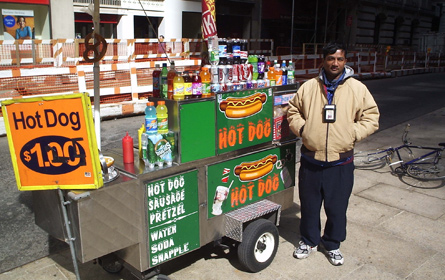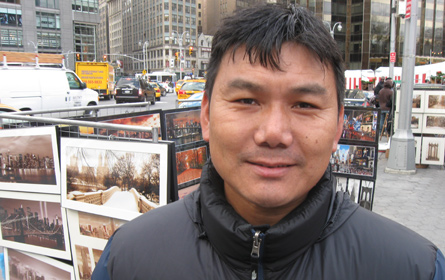Do You Make Money Selling Art in Parks Nyc

Mohammad Ali sells hot dogs Downtown.
Spring in New York means cherry blossoms in the Brooklyn Botanic Garden, the Yankees home opener and the return of vendors to city parks. But while the cherry copse are performing as usual and the Yankees returned to the Bronx to defeat the Angels yesterday, fewer vendors may peddle their wares in city parks this twelvemonth.
New rules proposed by the Department of Parks and Recreation would limit the number of artists selling their goods in Manhattan'due south most popular parks. These restrictions on vending come every bit the city has begun auctioning park spots to food vendors and cracking down on cart and table owners who leave their goods unattended. The rules and penalties, which the urban center argues are needed to combat irksome and sometimes dangerous congestion, complicate the already difficult situation for thousands of men and women who sell everything from paintings to pretzels on New York's busy streets.
Art in the Parks
For decades, parks have provided a safe refuge for artists to sell their work. Stroll through Battery Park or Union Square on a weekend and you will likely come across over a hundred artists displaying their work. But as the parks department proposes new rules to ease congestion, many artists volition need to find a new spot or a new job.
Different vendors who sell hot dogs or handbags, those who vend "expressive matter," such equally books, paintings and photographs, are protected by the Get-go Amendment. This has allowed fine art vendors to display their goods within city parks, while purveyors of more mundane goods, such as hot dogs, cannot.
The department has tried repeatedly to rid the parks of fine art vendors, but always lost in the courts. Its latest try would restrict the number of art vendors to nine in Battery Park, eighteen in Union Square, 5 on the High Line, and 49 in Central Park's loftier-traffic areas. If the new regulations pass, the spots volition be distributed on a beginning come up, get-go serve basis, potentially pitting artist confronting creative person.
The department will hold a hearing on the proposal on Apr 23.
"The three park locations that the proposed rules furnishings … have seen a dramatic increase in street vendors," Manhattan Parks Commissioner Pecker Castro said. "This has caused the parks department to come upwards with new regulations to observe a residuum between vendors and visitors."
The rule changes could hateful the terminate of a way of life for many artists. Two years ago, Samira Deroucha lost her task tutoring French. To pay her bills, she began selling her paintings in Wedlock Square.
Deroucha, who emigrated from French republic in 2001, said the new rules would create more than just a financial loss. "Union Square is one of the only places where local artists tin can express themselves," she said. "The street artists marketplace is on every unmarried tourist guide, and it would be a loss to the city if they got rid of u.s.."

Jampa Jordan sells photos in Columbus Circle. While selling of food and vesture is restricted, photos and other "expressive matter" is protected by the First Amendment. The city, though, wants to put some limits on the art vendors, also.
"If these rules pass we're going to defy them and sue the city," said Robert Lederman, the president of A.R.T.I.S.T., or Artists' Response To Illegal State Tactics, an advancement grouping that represents nigh i,500 street artists. Lederman and beau fine art vendors volition protest the dominion changes earlier the parks department's public hearing next calendar week.
Castro said the law is on the city's side. The proposed rules, he said, don't "violate anyone's first amendment rights. Regime has the right to place restrictions based on time, identify, and manner."
Hold the Mustard
Many of the fine art vendors, though, suspect the limit is an attempt to privatize urban center parks and get vendors to bid on spots.
Recently, the department granted Block & Shake a permit to sell gourmet cupcakes in forepart the Metropolitan Museum, an surface area that has been off limits to nigh food vendors. In return, Block & Milk shake will pay $108,000 to the city. The cupcake vendor also will pay $27,000 for a spot in Washington Square Park.
For years, the city auctioned spots around the Metropolitan Museum of Fine art to nutrient vendors. The permitting more or less fell apart, though, when armed forces veterans set up shop, saying they could sell without leasing the spot from the city. Last summer, the urban center croaky downward, forcing out near of the hot dog vendors.
Now the parks section wants vendors back -- simply non only whatever vendors. After reportedly saying it was looking for "healthy options," the assistants selected Block & Milk shake, a Long Island based company that sells $three cupcakes and $5 shakes.
Mean Streets
Castro said whatsoever vendors forced off the museum steps or out of the major Manhattan parks still will exist allowed to "sell their goods in other city parks and the thousands of miles of city sidewalks." Hakim Elnagar might tell him that's not as piece of cake as it might sound.
Continuing on 42nd Street, ii blocks west of Times Square, Elnagar watches as the menses of pedestrians quietly laissez passer by his cart. In over half an hr only one person stops to inquire for a pretzel.
Elnagar left Egypt thirteen years ago to find a better life for his family unit. As he has tried to build his business, he has found that the life of a street vendor is not easy. He and his fellow vendors must debate with rival pushcarts and local businesses, with tickets and constabulary, and with a arrangement of licensing that has created a black market place of illegal permits.
On Fri, Elnagar will appear in court to contest a ticket he received for vending in a bus stop. Elnagar said he will argue that the bus in question is a private tour charabanc that parked illegally and that his cart remains more than 100 feet away from a city bus finish.
The stakes for Elnagar are high. The maximum penalty for such violations reaches $ane,000, a lot of money for the average street vendor, who typically brings in about $14,000 to $17,000 a year. In the by year lonely, Elnagar received 17 tickets, most, he says, he did not deserve.
"The biggest trouble that vendors take is tickets," said Sean Basinski, the director of the Urban Justice Heart's Street Vendor Project, an advocacy group that provides legal representation for street vendors. Shuffling through a large pile of tickets, which has been growing over the by 2 months, Basinski picks out a few he views as particularly ridiculous: a shish kabob seller who left his cart window open, a fruit vender with a moldy blueberry, and vendor whose cooler stuck out from nether his table. Police force officers fine these slight infractions, Basinski says, because street vendors are "piece of cake targets."
"The vendor probably won't speak English language, probably won't complain, probably won't file a complaint and probably won't fifty-fifty be able to read what the ticket is for," he said.
To combat the ticketing, the Street Vendor Project provides measuring record and cameras while encouraging its member to take down the names and badge numbers of police officers. Basinski admits that this is sometimes easier said then done. Some constabulary officers roll up their windows and write tickets from inside their patrol automobile without giving vendors a chance to get names or ask questions.
Elnagar has contested tickets before and knows how the process works. He is confident the charges volition exist dropped, but even if he wins, Elnagar will still have a loss. "The captain says, 'I'm distressing for the wrong violation,' but what does sorry do for me?" he asked. "You take a solar day away from me, and the l, 60, 70 dollars I make for my kids."
"We piece of work hard, we want a proficient life," he said. "We try, we endeavour, but nosotros get nothing,"
To further complicate the picture, in Jan, the wellness department began to enforce its policy of removing the license sof vendors who leaves their carts unattended. Nether the new policy, "Any mobile food vending unit of measurement which is found to exist unattended or which a vendor has abandoned shall be considered an imminent health chance."
The policy has come under criticism for leaving vendors unable to answer when nature calls. On Feb. 23, street vendors protested outside the wellness department'south offices after peanut vender Mohammed Shirajul Islam lost his license for taking too long a bathroom break.
According to the health department, "The department's rules do not prevent vendors from taking curt breaks, but leaving food unsupervised poses a serious health hazard as it subjects the food to possible tampering." Critics, though, claim that anyone who wants to tamper with food does not need to wait for a vendor to save himself, but only to walk to the salad bar at the local grocery shop.
Crowding the Streets
While the vendors see themselves as minor businesspeople struggling to make a living and provide a service, many brick and mortar businesses accept a different view of street selling. "Information technology's a huge problem for our commercial and retail businesses," said Joseph Timpone, the director of operations for the Downtown Alliance. "It's a problem for pedestrians trying to get around."
"We have areas where there is no vending allowed at all, and every solar day we have people setting upward in the Earth Merchandise Center, a problem for the thousands who take the PATH," he said.
Unlicensed vendors and those who ignore vending laws cause unsafe "traffic weather," according to the Manhattan district attorney'due south office. On Canal Street, pedestrians often must step into the road to avoid sidewalks clogged past bag, t-shirt, and luggage vendors.
In 2009, the Offset Precinct, covering much of downtown Manhattan, arrested 810 unlicensed vendors. The Midtown North and Midtown South Precincts arrested 284, and 416 unlicensed vendors, respectively.
Black Market
In 1979, the city placed a cap on the number of licenses available, near three,000 for food vendors and 853 for general merchandise. In 2008, Mayor Michael Bloomberg's initiative to get good for you food into poor neighborhoods resulted in the approval of ane,000 new "dark-green carts" for fruit and vegetable vendors.
There is a loophole, though. The cap has not applied to veterans since World War II veteran Joseph Kaswan cited a Ceremonious War era law to challenge a ban on street vendors in midtown.
Even with that exemption, the competition for licenses remains strong. At one signal the city established a waiting list for individuals wanting to obtain a vending license. And then many practical, though, that the metropolis has not accepted any new names 2002.
With the market place largely frozen, vendors who retire or motion on to other occupations, continue to renew their licenses every two years for a $200 fee, then hire them out for up of $12,000. Past some estimates, nearly two thirds of the nutrient licenses are obtained in this way.
The health department has taken steps to gainsay the practice, but some feel their efforts have not gone far enough. To encourage people to study the illicit sales, the Street Vendors Project has proposed that vendors who report illegal license brokers receive a adventure to obtain their licenses legally, and go sidewalk entrepreneurs.
Then, though, they would be on their own.
0 Response to "Do You Make Money Selling Art in Parks Nyc"
Post a Comment